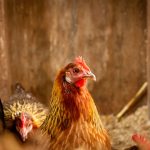Chickens have specific requirements for optimal health and well-being, particularly during winter. These include:
1. A warm, dry environment to shield them from cold and damp conditions.
2. Access to fresh water, which may require measures to prevent freezing. 3.
A balanced diet to maintain energy levels and body heat. 4. Additional protection during extreme cold temperatures.
Chickens are less efficient at regulating body temperature compared to mammals, making them more susceptible to cold. To address this, chicken coops should be:
1. Well-insulated
2.
Draft-free
3. Equipped with dry bedding materials like straw or wood shavings
These measures help maintain warmth and protect chickens from the elements. Proper insulation and bedding also keep chickens off the cold ground, providing essential insulation.
By understanding and addressing these needs, chicken owners can ensure their flock remains healthy and comfortable throughout the winter season.
Table of Contents
Key Takeaways
- Chickens need extra care in winter due to their susceptibility to cold temperatures
- Proper shelter with good insulation and dry bedding is essential for chickens in winter
- Heat lamps and heaters should be used cautiously to prevent fire hazards and burns
- Access to fresh, unfrozen water is crucial for chickens in winter
- Adjusting feeding habits, such as providing high-energy foods, can help chickens stay warm
- Regularly monitor chickens for signs of cold stress, such as shivering or reduced activity
- In extreme cold temperatures, additional measures like windbreaks or extra insulation may be necessary
Providing proper shelter and bedding
Insulating the Coop
A well-insulated coop that is free from drafts is essential for keeping chickens comfortable in cold weather. This can be achieved by sealing any gaps or cracks in the walls and windows, as well as ensuring that the coop is well-ventilated to prevent moisture buildup.
Bedding and Comfort
Additionally, providing a thick layer of dry bedding, such as straw or wood shavings, will help to insulate the coop and keep the chickens off the cold ground. By providing proper shelter and bedding, you can create a warm and comfortable environment for your chickens to thrive in during the winter months.
Coop Size and Roosting
In addition to providing a warm and dry shelter, it is important to consider the size of the coop in relation to the number of chickens being housed. Overcrowding can lead to increased moisture levels and a higher risk of cold stress, so it is important to ensure that there is enough space for all of the chickens to roost comfortably. Furthermore, providing roosting bars at different heights will allow chickens to huddle together for warmth and prevent them from sitting directly on the cold ground.
Using heat lamps and heaters safely

In some cases, providing additional heat may be necessary to keep chickens warm during the winter months. Heat lamps and heaters can be used to supplement the warmth provided by the coop, but it is important to use them safely to prevent fires and injuries. When using heat lamps or heaters, it is crucial to ensure that they are securely mounted and positioned away from any flammable materials, such as bedding or nesting materials.
Additionally, it is important to regularly check the condition of the heat source and replace any damaged or worn parts to prevent malfunctions. By using heat lamps and heaters safely, you can provide your chickens with the extra warmth they need without compromising their safety. It is also important to consider the type of heat source being used, as some options may be more suitable for a chicken coop than others.
For example, radiant heat panels are a safe and efficient option for providing supplemental warmth without the risk of fire or burns. Additionally, heated waterers can help prevent water from freezing, ensuring that chickens have access to fresh water at all times. By understanding how to use heat lamps and heaters safely, you can provide your chickens with the warmth they need to stay comfortable during the winter months without putting them at risk.
Ensuring access to fresh water
Access to fresh water is essential for chickens year-round, but it becomes even more crucial during the winter months when temperatures drop below freezing. Chickens require water for hydration, digestion, and regulating their body temperature, so it is important to ensure that they have access to fresh water at all times. To prevent water from freezing, heated waterers can be used to keep the water at a drinkable temperature.
Additionally, regularly checking and refilling waterers will help prevent dehydration and ensure that chickens have access to the water they need to stay healthy during the winter. In addition to preventing water from freezing, it is important to monitor water quality to ensure that it remains clean and free from contaminants. Chickens are susceptible to illness from drinking dirty water, so regularly cleaning waterers and providing fresh water will help prevent health issues.
By ensuring access to fresh water, you can help your chickens stay hydrated and healthy throughout the winter months.
Adjusting feeding habits for winter
Feeding habits may need to be adjusted during the winter months to ensure that chickens are receiving a balanced diet that meets their energy needs. In colder weather, chickens require more energy to maintain their body temperature, so it is important to provide them with a diet that is higher in calories. This can be achieved by offering a higher protein feed or supplementing their diet with grains such as corn or oats.
Additionally, providing access to fresh greens or vegetables can help supplement their diet with essential vitamins and nutrients that may be lacking in their regular feed. It is also important to monitor feeding habits during the winter months to ensure that all chickens are receiving enough food. In some cases, dominant birds may prevent others from accessing food, leading to malnutrition or weight loss.
By providing multiple feeding stations or spreading feed throughout the coop, you can ensure that all chickens have access to the food they need to stay healthy during the winter.
Monitoring for signs of cold stress

Recognizing Cold Stress in Chickens
During the winter months, it is essential to monitor chickens for signs of cold stress, which can indicate that they are not receiving adequate warmth or protection from the elements. Some common signs of cold stress in chickens include huddling together for warmth, fluffed feathers, decreased activity, or decreased egg production. Additionally, frostbite on combs or wattles can be a clear indication that chickens are not adequately protected from the cold.
Taking Proactive Measures
By monitoring for signs of cold stress, you can take proactive measures to ensure that your chickens are comfortable and healthy during the winter months. This may involve providing additional insulation or heat sources in the coop, adjusting feeding habits, or providing extra bedding for warmth.
Preventing Health Issues
By addressing signs of cold stress promptly, you can help prevent health issues and ensure that your flock remains happy and healthy throughout the winter.
Implementing additional measures for extreme cold temperatures
In extreme cold temperatures, additional measures may be necessary to ensure that chickens are safe and comfortable. This may include using windbreaks or tarps to protect coops from harsh winds, providing extra insulation such as hay bales or straw around the coop, or using heated perches to prevent frostbite on feet or toes. Additionally, providing extra bedding or nesting materials can help chickens stay warm and comfortable during extreme cold temperatures.
It is also important to consider the timing of activities such as feeding and cleaning during extreme cold temperatures. Feeding chickens in the morning can help provide them with extra energy before facing the coldest part of the day, while cleaning coops in the afternoon can allow time for any moisture buildup to evaporate before nighttime. By implementing additional measures for extreme cold temperatures, you can help ensure that your chickens are safe and comfortable even in the harshest winter conditions.
In conclusion, understanding the needs of chickens in winter is crucial for ensuring their health and well-being during the colder months. By providing proper shelter and bedding, using heat lamps and heaters safely, ensuring access to fresh water, adjusting feeding habits, monitoring for signs of cold stress, and implementing additional measures for extreme cold temperatures, you can help your flock stay healthy and happy throughout the winter. With careful attention and proactive measures, you can create a warm and inviting environment for your chickens to thrive in even during the coldest months of the year.
If you’re looking for tips on how to keep chickens warm in winter, you might also be interested in learning about how to care for goslings. Check out this article for helpful information on raising and nurturing young geese.
FAQs
What are some ways to keep chickens warm in winter?
Some ways to keep chickens warm in winter include providing a well-insulated coop, using heat lamps or heated pads, and ensuring good ventilation while avoiding drafts.
What temperature is too cold for chickens?
Chickens can handle cold temperatures quite well, but they may start to experience discomfort and health issues if the temperature drops below 0°F (-18°C).
How can I insulate my chicken coop for winter?
You can insulate your chicken coop for winter by adding extra bedding, sealing any drafts, and using insulating materials such as foam board or straw bales.
Is it safe to use heat lamps in a chicken coop?
Heat lamps can be used in a chicken coop, but they should be used with caution to avoid fire hazards. Make sure to secure the lamps properly and keep them away from flammable materials.
What should I feed my chickens in winter to help keep them warm?
In winter, you can feed your chickens high-energy foods such as cracked corn, sunflower seeds, and mealworms to help keep them warm. Additionally, make sure they have access to fresh water at all times.
Meet Walter, the feathered-friend fanatic of Florida! Nestled in the sunshine state, Walter struts through life with his feathered companions, clucking his way to happiness. With a coop that’s fancier than a five-star hotel, he’s the Don Juan of the chicken world. When he’s not teaching his hens to do the cha-cha, you’ll find him in a heated debate with his prized rooster, Sir Clucks-a-Lot. Walter’s poultry passion is no yolk; he’s the sunny-side-up guy you never knew you needed in your flock of friends!







